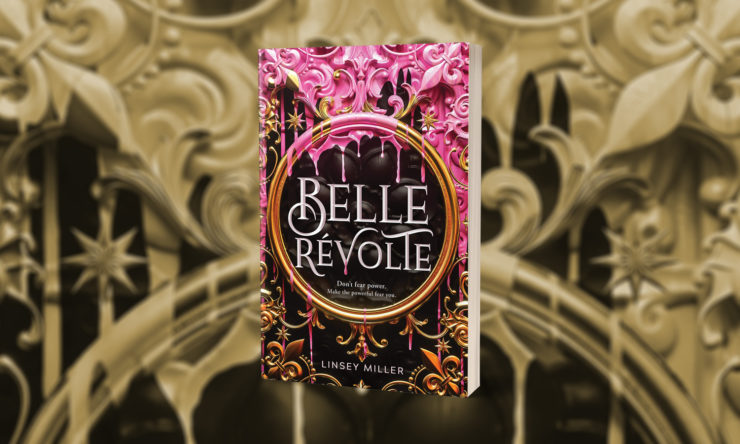Two young women stand on the brink. One faces a life of unfathomable wealth and absolute privilege, another a life of drudgery and desperation. Both want something else, something more, and when the opportunity arrives they jump at it. This is a story of two teenagers who gain everything they want only to risk it all to save the kingdom and stop an unstoppable king. They fight for the soul of their nation, the heart of their people, and their own burgeoning identities.
At first Belle Révolte feels familiar and predictable, then it veers into the intriguing and refreshing. Emilie de Marais, heir to a powerful duchy, is spoiled and privileged but wants nothing more than to be free of her corsets and delicate dresses. Annette Boucher is a poor girl with little to her name but the guilt of not being able to save her sister from a painful death. Each has a gift for a different kind of magic but no access to the training needed to turn that talent into a craft. A chance meeting leads them to the discovery not only that they look similar but that each wants what the other has. Emilie swaps places with Annette and runs off to join an apprenticeship at a medical facility while Annette heads off to a magic finishing school.
Buy the Book


Belle Révolte
Although she’d rather learn how to be a physician (a profession only men are allowed to hold), she thrives in her role as an apprentice hack. The job has its downsides – the more a physician channels magic through her, the faster her body breaks down until she either retires young or dies – but the knowledge and skills she acquires is worth it. Meanwhile Annette puts up with the insufferable lessons on managing an estate and etiquette so she can train one-on-one with the kingdom’s foremost magical artist. Divination remains a challenge, but scrying becomes easier and easier.
As the girls settle into their new lives, a rebellion rumbles in the background. Local revolutionary leaders stoke the flames of frustration in the people of Demeine. At first the insurrection targets the extreme inequalities between the rich and poor and the exploitation of the working class’s labor. But once Annette and Emilie and their mutual cadre of colleagues and companions uncover the terrible truth about the king and his hacks, the insurrection goes from a call for change to a call to action. They must prevent the king and his associates from dragging Demeine into an ill-planned war with a neighboring kingdom and end his heartless cruelty, and they must do it all with few resources and a massive imbalance of power.
Despite the action-heavy plot, Belle Révolte is a character-driven story. The cast is extensive; Annette and Emilie dominate the narrative, but each are supported by at least three companions about their age, a couple of teachers and antagonists, and family members with whom they have complicated relationships. Unfortunately, everyone not Emilie and Annette are largely under-developed. Fortunately, the two main characters are fairly nuanced and with unique voices and personalities. Emilie and Annette act as twin stars around whom everyone else orbits. As long as I kept the leads in my sights, it did not matter that I kept forgetting which of the secondaries was which.
On top of that, the plot moves glacially slow for the first two thirds then races through the final set piece before slamming to a halt on the two epilogues. Although I enjoyed what I was reading, the actual experience of reading was occasionally jarring. The combination of too many two-dimensional characters and off-kilter pacing could make for a less than ideal read, but Linsey Miller somehow pulls it off. I was engaged the whole way through, binging it in two sittings.
Part of what makes Belle Révolte so interesting is the variety and depth of queerness represented. One character is acespec and biromantic and falls for another character who is a lesbian. Another is a ciswoman who pairs off with a transman. There are characters who are openly nonbinary and/or take other various spots along the LGBTQIA+ spectrum. While the kingdom isn’t completely accepting of all identities, Miller avoids on-the-page scenes of queer/transphobia. Oppression in Demeine is tied to class and gender rather than sexual identity or race.
More than anything I think what I appreciated the most was how Miller folded consent and allyship into the narrative. Permission is requested before touching, even when the intent is romantic. When a character is made aware of a privilege they did not know they had – whether wealth or power or being cisgender – they acknowledge it and not only strive to use their privilege to aid those who have none but try to change the system so power is equally distributed in the future. It feels organic and honest to the characters and the story. I want more of this in YA fantasy fiction, more consent, more characters openly discussing justice and reparations, more layered examples of queerness. Belle Révolte may not be perfect, but it does representation so well that I loved it anyway.
Belle Révolte is available from Sourcebooks.
Read an excerpt here.
Alex Brown is a teen services librarian by day, local historian by night, author and writer by passion, and an ace/aro Black woman all the time. Keep up with her on Twitter and Insta, or follow along with her reading adventures on her blog.










